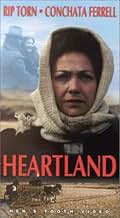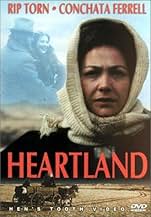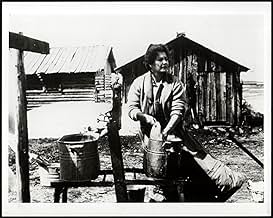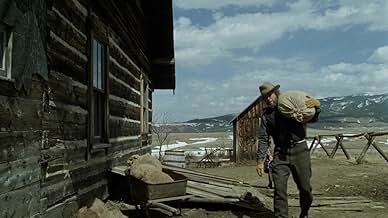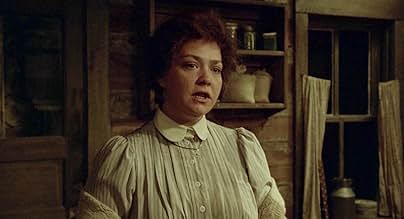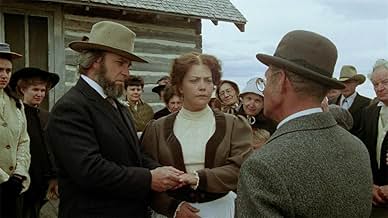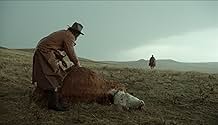PUNTUACIÓN EN IMDb
7,2/10
1,3 mil
TU PUNTUACIÓN
Añade un argumento en tu idiomaA widow with a young daughter travels to a ranch in Wyoming to manage the household of a rancher. After a while the man and woman develop a relationship that leads to a marriage. But life in... Leer todoA widow with a young daughter travels to a ranch in Wyoming to manage the household of a rancher. After a while the man and woman develop a relationship that leads to a marriage. But life in the harsh place takes its toll.A widow with a young daughter travels to a ranch in Wyoming to manage the household of a rancher. After a while the man and woman develop a relationship that leads to a marriage. But life in the harsh place takes its toll.
- Premios
- 4 premios en total
Argumento
¿Sabías que...?
- CuriosidadesLetters written by Elinore Pruitt Stewart (aka Elinore Stewart) provided the basis for the film. These letters dated from April 1909 to November 1913 and were first printed in "The Atlantic Monthly".
- PifiasThe story is set in 1910. When Elinore and Jerrine are riding across the prairie, they are singing the hymn "In The Garden" which was published in 1912, according to Wiki.
- ConexionesFeatured in Sneak Previews: Independent Films (1981)
Reseña destacada
I saw Heartland when it was first released in 1980 and I have just seen it again. It improves with age. Heartland is not just for lovers of "indie" films. At a time when most American films are little more than cynical attempts to make money with CGI, pyrotechnics, and/or vulgarity, Heartland holds up as a slice of American history. It is also a reminder of how spoiled most of us modern, urbanized Americans are.
Nothing in this film is overstated or stagey. No one declaims any Hollywood movie speeches. The actors really inhabit their roles. This really feels like a "small" film but really it is bigger than most multizillion-dollar Hollywood productions.
The film is based on the lives of real people. In 1910, Elinore Randall (Conchata Ferrell, who has never done anything better than this), a widow with a 7-year-old daughter Jerrine (Megan Folsom), is living in Denver but wants more opportunities. She advertises for a position as housekeeper. The ad is answered by Clyde Stewart (Rip Torn, one of our most under-appreciated actors), a Scots-born rancher, himself a widower, with a homestead outside of Burnt Fork, Wyoming. Elinore accepts the position (seven dollars a week!) and moves up to Wyoming with her daughter. She and her daughter move into Stewart's tiny house on the property. It is rolling, treeless rangeland, a place of endless vistas where the silence is broken only by the sounds made by these people and their animals. It's guaranteed to make a person feel small. The three characters go for long periods without seeing another human soul. What is worse, Stewart turns out to be taciturn to the point of being almost silent. "I can't talk to the man," Elinore complains to Grandma Landauer. "You'd better learn before winter," replies Grandma. Grandma (Lilia Skala) is one of the only two other characters who are seen more than fleetingly. She came out to Wyoming from Germany with her husband many years before and runs her ranch alone now that she is also widowed. Grandma is their nearest neighbor (and the local midwife) and still she lives ten miles away! The other supporting character is Jack the hired hand (Barry Primus).
Elinore's routine (and her employer's) is one of endless, backbreaking labor, where there are no modern conveniences and where everything must be made, fixed or done by hand. This is the real meat of the film: Watching the ordinary life of these ranchers as they struggle against nature to wrest a living from the land. But despite the constant toil and fatigue, Elinore is always looking for other opportunities. She learns that the tract adjacent to Stewart's is unclaimed. Impulsively, she files a claim on the property (twelve dollars, or almost two weeks' pay!), meaning that if she lives on it (and she must actually live there) and works it for ten years, she will get the deed to it. Naturally, Stewart learns what she has done. With merciless logic, he points out that with no money, no livestock, no credit, and no assets, she has no chance of succeeding. He then offers a solution: He proposes marriage. The stunned Elinore realizes that this is the only real alternative, and accepts.
We think that Stewart's proposal is purely Machiavellian---he wants the land and the free labor---but we see that, in fact, he is genuinely fond of Elinore, and they grow together as a couple. She becomes pregnant; she goes into labor in the middle of a midwinter blizzard; Clyde travels for hours on horseback through the storm the ten miles to Grandma's and the ten miles back, only to announce that Grandma wasn't there. This is more like real life than is pleasant, folks. Elinore has the baby all by herself, with no help whatsoever. Their son is still an infant when he gets sick and dies. They lose half their livestock to the vicious winter. They struggle on. The last sequence in the film is supposed to be optimistic: The birth of a calf. Clyde calls Elinore urgently to help him deliver the calf. Instead of being head first, the calf is in a footling breech presentation. He and Elinore must physically pull the calf out of the birth canal. There is no CGI, animatronics, trickery, fakery or special effects: What you see is what happened, folks: A calf is born on a bed of straw in a wooden barn by lamplight. With that, the film does not so much end as simply stop, leaving the viewer unsatisfied, but after a while you appreciate the film as a whole, not just for its ending.
This little gem rewards patience and thoughtfulness. It will be watchable long after most of the films of the last generation have long been forgotten.
Nothing in this film is overstated or stagey. No one declaims any Hollywood movie speeches. The actors really inhabit their roles. This really feels like a "small" film but really it is bigger than most multizillion-dollar Hollywood productions.
The film is based on the lives of real people. In 1910, Elinore Randall (Conchata Ferrell, who has never done anything better than this), a widow with a 7-year-old daughter Jerrine (Megan Folsom), is living in Denver but wants more opportunities. She advertises for a position as housekeeper. The ad is answered by Clyde Stewart (Rip Torn, one of our most under-appreciated actors), a Scots-born rancher, himself a widower, with a homestead outside of Burnt Fork, Wyoming. Elinore accepts the position (seven dollars a week!) and moves up to Wyoming with her daughter. She and her daughter move into Stewart's tiny house on the property. It is rolling, treeless rangeland, a place of endless vistas where the silence is broken only by the sounds made by these people and their animals. It's guaranteed to make a person feel small. The three characters go for long periods without seeing another human soul. What is worse, Stewart turns out to be taciturn to the point of being almost silent. "I can't talk to the man," Elinore complains to Grandma Landauer. "You'd better learn before winter," replies Grandma. Grandma (Lilia Skala) is one of the only two other characters who are seen more than fleetingly. She came out to Wyoming from Germany with her husband many years before and runs her ranch alone now that she is also widowed. Grandma is their nearest neighbor (and the local midwife) and still she lives ten miles away! The other supporting character is Jack the hired hand (Barry Primus).
Elinore's routine (and her employer's) is one of endless, backbreaking labor, where there are no modern conveniences and where everything must be made, fixed or done by hand. This is the real meat of the film: Watching the ordinary life of these ranchers as they struggle against nature to wrest a living from the land. But despite the constant toil and fatigue, Elinore is always looking for other opportunities. She learns that the tract adjacent to Stewart's is unclaimed. Impulsively, she files a claim on the property (twelve dollars, or almost two weeks' pay!), meaning that if she lives on it (and she must actually live there) and works it for ten years, she will get the deed to it. Naturally, Stewart learns what she has done. With merciless logic, he points out that with no money, no livestock, no credit, and no assets, she has no chance of succeeding. He then offers a solution: He proposes marriage. The stunned Elinore realizes that this is the only real alternative, and accepts.
We think that Stewart's proposal is purely Machiavellian---he wants the land and the free labor---but we see that, in fact, he is genuinely fond of Elinore, and they grow together as a couple. She becomes pregnant; she goes into labor in the middle of a midwinter blizzard; Clyde travels for hours on horseback through the storm the ten miles to Grandma's and the ten miles back, only to announce that Grandma wasn't there. This is more like real life than is pleasant, folks. Elinore has the baby all by herself, with no help whatsoever. Their son is still an infant when he gets sick and dies. They lose half their livestock to the vicious winter. They struggle on. The last sequence in the film is supposed to be optimistic: The birth of a calf. Clyde calls Elinore urgently to help him deliver the calf. Instead of being head first, the calf is in a footling breech presentation. He and Elinore must physically pull the calf out of the birth canal. There is no CGI, animatronics, trickery, fakery or special effects: What you see is what happened, folks: A calf is born on a bed of straw in a wooden barn by lamplight. With that, the film does not so much end as simply stop, leaving the viewer unsatisfied, but after a while you appreciate the film as a whole, not just for its ending.
This little gem rewards patience and thoughtfulness. It will be watchable long after most of the films of the last generation have long been forgotten.
- mfisher452
- 18 mar 2006
- Enlace permanente
Selecciones populares
Inicia sesión para calificar y añadir a tu lista para recibir recomendaciones personalizadas
- How long is Heartland?Con tecnología de Alexa
Detalles
Taquilla
- Presupuesto
- 600.000 US$ (estimación)
Contribuir a esta página
Sugerir un cambio o añadir el contenido que falta

Principal laguna de datos
By what name was Heartland (1979) officially released in Canada in English?
Responde

